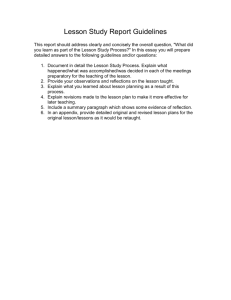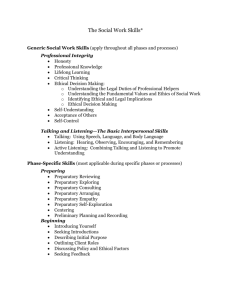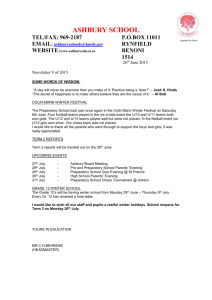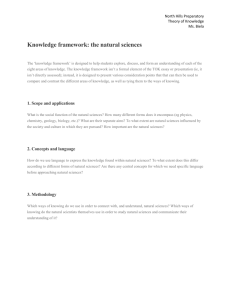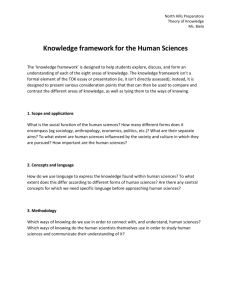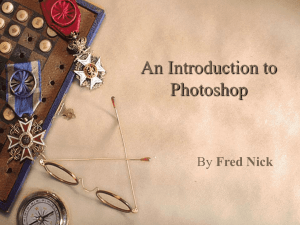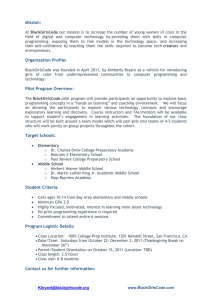CourCh5_2006
advertisement
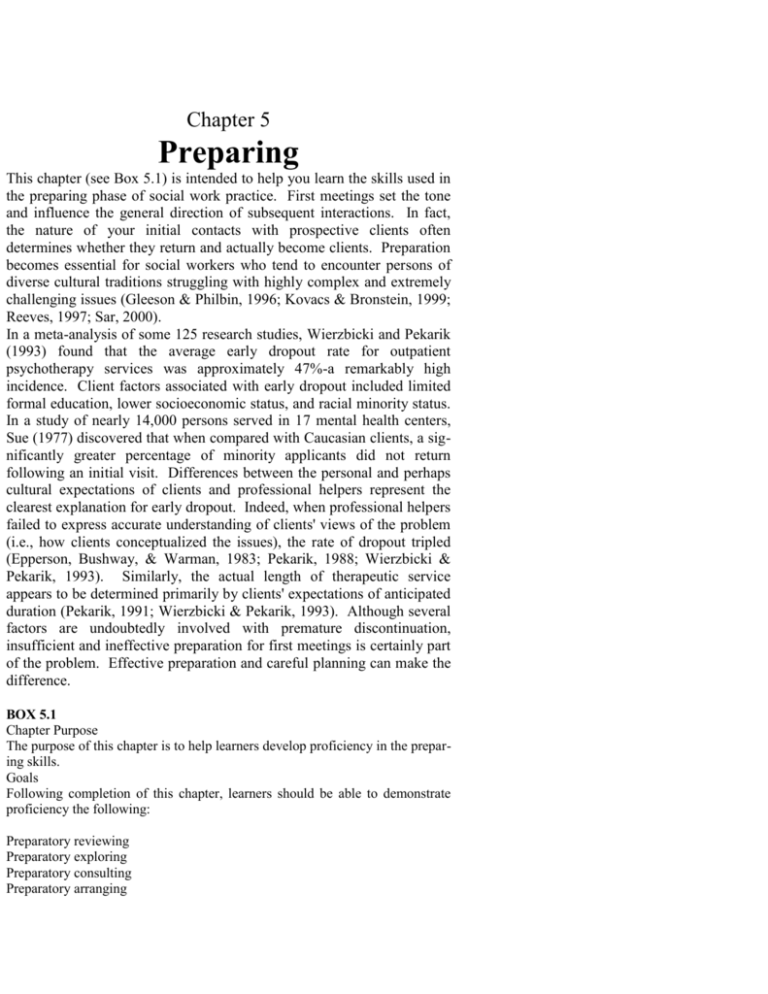
Chapter 5 Preparing This chapter (see Box 5.1) is intended to help you learn the skills used in the preparing phase of social work practice. First meetings set the tone and influence the general direction of subsequent interactions. In fact, the nature of your initial contacts with prospective clients often determines whether they return and actually become clients. Preparation becomes essential for social workers who tend to encounter persons of diverse cultural traditions struggling with highly complex and extremely challenging issues (Gleeson & Philbin, 1996; Kovacs & Bronstein, 1999; Reeves, 1997; Sar, 2000). In a meta-analysis of some 125 research studies, Wierzbicki and Pekarik (1993) found that the average early dropout rate for outpatient psychotherapy services was approximately 47%-a remarkably high incidence. Client factors associated with early dropout included limited formal education, lower socioeconomic status, and racial minority status. In a study of nearly 14,000 persons served in 17 mental health centers, Sue (1977) discovered that when compared with Caucasian clients, a significantly greater percentage of minority applicants did not return following an initial visit. Differences between the personal and perhaps cultural expectations of clients and professional helpers represent the clearest explanation for early dropout. Indeed, when professional helpers failed to express accurate understanding of clients' views of the problem (i.e., how clients conceptualized the issues), the rate of dropout tripled (Epperson, Bushway, & Warman, 1983; Pekarik, 1988; Wierzbicki & Pekarik, 1993). Similarly, the actual length of therapeutic service appears to be determined primarily by clients' expectations of anticipated duration (Pekarik, 1991; Wierzbicki & Pekarik, 1993). Although several factors are undoubtedly involved with premature discontinuation, insufficient and ineffective preparation for first meetings is certainly part of the problem. Effective preparation and careful planning can make the difference. BOX 5.1 Chapter Purpose The purpose of this chapter is to help learners develop proficiency in the preparing skills. Goals Following completion of this chapter, learners should be able to demonstrate proficiency the following: Preparatory reviewing Preparatory exploring Preparatory consulting Preparatory arranging Preparatory empathy Preparatory self-exploration centering Preliminary planning and recording Ability to assess proficiency in the preparing skills You need to be personally and professionally ready to perform competently from the first moment of contact. You should use the preparing skills before the first meetings with clients and other persons with whom you interact as part of your professional responsibilities. Then continue to use them in advance of each subsequent encounter The preparing skills include (1) preparatory reviewing, (2) preparatory exploring, (3) preparatory consulting, (4) preparatory arranging, (5) preparatory empathy, (6) preparatory self-exploration, (7) centering, and (8) preliminary planning and recording. Preparatory Reviewing Preparatory reviewing involves examining and considering information available to you and your agency before an initial contact with another person (Kadushin, 1983, pp. 136-137). When a prospective client has received service at the agency before, review the relevant records the agency has on file. When a telephone contact or in person intake admissions interview has preceded the first visit, examine notes concerning the nature and substance of that interaction. For first meetings with other persons, such as an agency director, a client's medical doctor, or a new supervises, thoughtfully review relevant materials concerning the general purpose for the meeting and any topics likely to be addressed. Preparatory reviewing helps you grasp significant factual information. This reduces the need for applicants, clients, or other persons to repeat information they have previously provided. It allows for more efficient use of time and helps people feel that what they say is valued and remembered. In some instances, failure to review available materials could constitute professional negligence. For example, suppose a teenage boy contacts the agency. He has a history of making serious suicide attempts following conflicts in romantic relationships. Your agency has served him off and on during the past several years, and the pattern of previous suicide attempts is clearly recorded in his case file. He requests an appointment for some time later that day, indicating that he needs help because his girlfriend recently "dumped" him, deciding that she wanted to date another boy. If you fail to review the case record, you may decide to give the teenager an appointment several days from now, not realizing the serious risk of suicide. There are also numerous practical reasons for reviewing relevant information before a visit. You may learn, for example, that a prospective client is hard-of-hearing or does not speak any of the languages spoken in your agency, so an interpreter will be required. You might find out that a client uses a wheelchair or is accompanied by a canine companion, so that a chair must be removed from your office to allow enough open space. Although there are many benefits associated with the review of materials, there are potential dangers as well. Some records contain hearsay information or opinions that are expressed as if they were undisputed facts. You may inadvertently accept at face value information that is essentially false, distorted, biased, or superficial. Some records contain personality profiles or psychiatric diagnoses that can lead you to form a stereotypical impression of a person before you actually meet. Such profiles and diagnoses may have been inaccurate when initially recorded, or they may have since become so. The person, the issue, or the situation may have changed, sometimes dramatically. In preparatory reviewing, recognize that information contained in case records or other forms of written material may be incomplete or mistaken. It is vital that you maintain an open mind during the preparatory reviewing phase. Preparatory Consulting The skill of preparatory consulting involves seeking advice from a social work supervisor or colleagues concerning an upcoming visit with a prospective client or other person. Commonly, you would seek such consultation to identify tentative objectives for an interview or to discuss other related practice considerations. The specific nature of the consultation, however, varies from situation to situation. On one occasion, you might discuss possible locations for the interview. In another, you might inquire about cultural customs of a particular religious or ethnic group about which you have limited knowledge. On occasion, you might seek advice concerning how best to ensure your own safety when you are about to interview a person who has previously been physically violent toward people in positions of authority. In still another, you might focus on the agency policies or legal obligations that could apply in a particular case. By engaging in preparatory consultation, you can enhance the quality of initial meetings. The usually modest investment of time it takes to consult with a colleague or supervisor can pay significant dividends in effectiveness. Of course, as you gain actual social work practice experience, the felt need for preparatory consultation will probably decrease. Nonetheless, ongoing consultation with colleagues and supervisors after initial meetings and during the course of service is often useful and sometimes needed. Even after years of experience, there are unexpected, unusually complicated circumstances where preparatory consultation can make the difference between a helpful or unhelpful beginning. Preparatory Arranging The skill of preparatory arranging involves logistical preparation for a first meeting. It includes scheduling an appointment, ensuring that there is adequate time and privacy, and organizing the physical environment. It may involve securing an interview room, locating an interpreter, or rearranging furniture. It includes considering the appropriateness of your apparel, appearance, and perhaps even hygiene. Some clients are offended by a social worker's noticeable body odours; other people are allergic to perfumes or colognes and react adversely to such scents. Some cultures reflect preferences that can easily be respected - if you know about them and make the necessary accommodations ahead of time. Rectifying cultural faux pas tends to be much more difficult than avoiding them. Preparatory arranging could involve any number of considerations: locating transportation for a client, or perhaps organizing temporary childcare so that you can meet separately with a parent. Also consider the significance of the environment for clients when making visits outside your agency (Kadushin, 1983, pp. 141-148). Many people assign special meaning to their homes and might feel ill at ease should you arrive before adequate preparations could be made. Food may also have significance to a client, or certain chairs in a home may be reserved for specific persons. Therefore, always pay close attention so you convey respect for these special familial and cultural meanings. In agency settings, preparatory arranging includes considering the potential effects of the physical environment. Do clients have a comfortable place to sit when they arrive at the agency? Are interviewing rooms sufficiently soundproofed that privacy may be maintained? When you have office space assigned to you, arranging involves selecting and displaying pictures, posters, and other items such as college degrees, professional certificates, and your social work license. It may also include selecting paints or wallpapers and placing furniture. The office environment can have a powerful impact on clients. Suppose, for example, that you provide social services in an area where firearms are widely prized. You would be unwise to decorate your office wall with a poster that reads, "Ban handguns." You could needlessly alienate many clients. Personal or political messages may interfere with clients' ability to experience you as an objective professional who genuinely respects them. In sum, preparatory arranging should facilitate communication and diminish, to the extent possible, interference and distraction. Although it requires some time and reflection, the investment often pays substantial dividends. Preparatory Empathy Preparatory empathy involves "putting oneself in the client's shoes and trying to view the world through the client's eyes" (Shulman, 1984, p. 22). You try to "get in touch with the feelings and concerns that the client may bring to the helping encounter” (Shulman, 1992, p. 56). Even before an initial face-to-face meeting, anticipatory empathy heightens your sensitivity to the prospective client's possible agenda, thoughts, feelings about himself or herself, the presenting issue, and the situation. THIS WILL HOLD TRUE FOR YOUR FINAL AUDIO TAPE INTERVIEW. AT THIS POINT YOU CAN TAKE ALL THE KEY THEMES FROM THE LAST FEW INTERVIEWS AND BEGIN THE FINAL INTERVIEW WITH A CAPSULE FORM OF WHAT THE STUDENT/CLIENT HAS PRESENTED SO FAR. Through preparatory empathy, you try to anticipate the client's subjective experience related to seeking or receiving social service. You put yourself in the other's shoes so you gain increased appreciation for the client's motivation for the contact, thoughts, and feelings about engaging an authority figure, and potential issues related to the client's sex, stage of life, culture, ethnic background, and socioeconomic status. Preparatory empathy regarding cultural aspects is especially important. Members of some cultural groups may be ambivalent or conflicted about visiting a social worker. Certain people may prefer a slow and informal beginning. Others might find it difficult to share personal information about their families. Some may be concerned that their culturally appropriate, traditional sex and family roles might be challenged. For many people, visiting an agency is not a simple request for service. The meaning of this event can be extraordinarily complicated for members of many cultural groups. Therefore, as you engage in preparatory empathy with each new client, be sensitive to the potential cultural implications of the upcoming interview. Preparatory empathy involves trying to experience, on the basis of whatever limited information is available to you, what the client may be thinking and feeling as this interview begins. Because preparatory empathy is done in advance of face-to-face contact, realize that much of the time you will be off target. Preparatory empathy is therefore always tentative, always preliminary, and always subject to immediate change based on the client's actual communications. Even when your preparatory empathy proves to be inaccurate, however, it is a productive activity because it enhances your readiness to listen carefully to the client when you finally do meet in person. Returning to the upcoming visit with the new client, Mrs. Nancy Cannon, a social worker engaging in preparatory empathy might review the telephone intake report and then go through a mental process such as the following: If I were in Mrs. Cannon's shoes, I might feel anxious for, concerned about, and disappointed in my daughter. I would also love her a great deal. I might feel responsible and perhaps even guilty about my parenting behaviour. I might feel uncertain about how to proceed. I could very well feel inadequate and maybe frightened. I would be concerned about what the future might hold for Amy and for me. I am aware that my husband's divorce petition and his recent departure from the home may have adversely affected my daughter, and I might feel angry at him - both on my own behalf as well as my daughter's. If I believed I could have been a better spouse or taken actions to prevent his departure, I might also feel guilty about the separation and upcoming divorce proceedings. I might perceive the divorce as the result of some misbehaviour of my own. Alternately, I may have initiated the divorce process and experience conflicted feelings about the decision to do so. However the separation and divorce process began, I would feel a great deal of stress during this period. I would probably feel confused about the present and fearful about the future. I might be concerned about finances; about after-school supervision of Amy; about my ability to guide and discipline Amy; about whether there is another person in my husband's life; about whether there is now or ever will be someone else in my life; about my capacity to assume the roles of a single person and a single parent; about my ability to deal with my husband around parental issues concerning Amy; and about dozens of other issues provoked by my husband's departure and Amy's recent behaviour. I would probably feel enormously burdened and perhaps overwhelmed by the events of recent weeks. If sadness and grieving have not yet occurred, I might begin to experience them soon. It is also possible that I may have begun to anticipate that not only has my husband left the household, but eventually Amy will also leave. After all, she is already 14. Mrs. Cannon seems to be of a different ethnic background than my own and I am at least 10 years younger. I have never been married and do not have children of my own (Mrs. Cannon may ask about my marital and parental status.) As a result of these cultural and status differences, she may experience me as unable to understand and appreciate her situation. She may even see me as less able to help her, since I have not gone through some of these same difficulties. Engaging in the skill of preparatory empathy helps to sensitize you to what others might experience as meetings get underway. By empathizing in advance, you increase the likelihood that you will approach the prospective client as a unique human being with all of the complexity that entails. A major challenge in this form of anticipatory empathy, however, is resisting the temptation to narrow your view of the person so that it becomes more of a fixed stereotype than an open set of possibilities. Preparatory Self-Exploration In addition to preparatory empathy, you should also engage briefly in preparatory self- exploration before meeting with clients or prospective clients. Preparatory self exploration is a form of self-analysis or introspection through which you, a human being who happens to be a social worker, identify how you might be affected by your interaction with this particular person, this specific issue of concern, and this unique situation. In self-exploring, you would ask yourself questions such as "How am I likely to feel about this individual or family? How are the cultural and demographic similarities or differences between us likely to affect me? Given what I know about the issue and situation, what personal reactions might I expect to experience?" The purpose of this skill is to identify the potential effects of your own personal history, characteristics, needs, biases, emotional tender spots, and behavioural patterns. Self-exploration helps you to bring into conscious focus those aspects of your personal self that might affect the nature and quality of your social work services to a particular client. Preparatory self-exploration also involves identifying other personal factors that may affect your readiness to provide service. For example, there may be extraneous factors unrelated to the particular client that might influence you personally. If you have a splitting headache, are dealing with the break-up of a significant relationship, are in the process of repairing your furnace, have just lost out on an opportunity for promotion, did not sleep last night, or are worried about a family member of your own, the quality of your service might be affected. Identifying these factors and their effects on you constitutes the first step toward managing them so that they do not interfere with the high-quality professional service that all clients deserve. Centering When, through preparatory self-exploration, you have identified personal factors that might affect your ability to provide high-quality service to a prospective client, you attempt to manage or contain them. As part of this centering process, you ask yourself, "What can I do to ready myself personally before the meeting begins?" Centering involves organizing your personal thoughts, feelings, and physical sensations so that they do not interfere with the performance of your professional obligations and delivery of social services. Depending on the personal factors involved, centering might include various kinds of activities. Among the more common are brief stress-management exercises intended to reduce emotional reactivity and promote self-control. Among the useful stressreducing activities are positive self-talk, visualization, muscular relaxation, journal writing, and brief meditation. BEFORE YOUR LAST AUDIO RECORDED INTERVIEW, YOU MIGHT DO SOME TIME OF MEDITATION, BREATH RELAXATION, ETC. ETC. AND EXPLAIN HOW THIS MIGHT HAVE BEEN HELPFUL TO YOU. Suppose, for example, you had once been the victim of date rape. At that time, you had somehow minimized the significance of the violation and have not addressed it since. Recently, you became aware that you still have strong feelings and some unresolved issues about the event. You have decided to seek out a social worker for help in this matter. As you look at the intake form of the new client you are scheduled to meet later today, you read that she was raped two weeks ago by a man she had dated once before. Through preparatory self-exploration, you might recognize that you remain unsettled about the rape, even though it happened years before. You also realize that you would probably not serve this client well if you are caught up in the emotions of your own experience. Therefore, you might center yourself by taking a few deep breaths, engaging in a brief relaxation exercise, and compartmentalizing (temporarily putting into an enclosed area of yourself) your personal experience so you can provide frill attention to the client. As part of the process, you say to yourself, "I'm still tender about being raped but I'm able to manage my feelings of rage and shame and fear so that they don't get in the way of my service to this client. Since it is obvious, however, that I still have some unresolved issues, I hereby commit myself to arrange for an appointment for myself with that social worker I've heard about. I promise that I will telephone her agency office at 1 o'clock when I have a free hour." In centering, please do not deny or minimize your personal issues and strong feelings. Rather, manage them temporarily and develop a specific plan to address them at another time in a more appropriate context. Preliminary Planning and Recording As a social worker, you should engage in the skill of preliminary planning before meetings, contacts, and interviews with clients and other people with whom you interact as part of your professional duties. Begin the process of formulating a preliminary plan by asking and answering questions such as "Why is this meeting occurring? What is its overall purpose? What do I hope to accomplish through this meeting? What is my tentative agenda? What might be the other person's agenda? What would I consider to be a successful meeting? What are my functions or roles in this meeting? How do I wish to begin? What things should I say? What questions should I ask? What kind of interactional process would I like to see? How would I like the meeting to conclude?" AGAIN, IN THE FINAL AUDIO RECORDED INTERVIEW, YOU SHOULD TRY TO USE AS MANY OF THE REFELCTIVE SKILLS AS POSSIBLE BEFORE ATTEMPTING QUESTIONS OR PROBES. IN ESSENCE, THERE SHOULD BE MORE REFELCTIVE TYPE QUESTION THAN A BARAGE OF QUESTIONING THAT MAY COME OFF AS INTERROGATIVE AS OPPOSED TO AN EMPATHIC SOCIAL WORK INTERVIEW. Kadushin suggested that the "general purposes of most social work interviews can be described as informational (to make a social study), diagnostic (to arrive at an appraisal), and therapeutic (to effect change)" (1 983, p. 21). In information-gathering interviews, you encourage people to discuss their views and feelings about themselves, their preferences and strengths, issues and goals, and the situation. Basically, you gather data that may help you and your client reach a better understanding of the circumstances. In information-giving interviews, you share needed or useful knowledge. You might offer information about a program, policy, or resource in your attempt to respond to a request or address a perceived need. In assessment-forming interviews, your overall purpose is to arrive at an assessment, diagnosis, evaluation, or conclusion. Often, such an interview is followed by the preparation of a recommendation. In change-making interviews, you effect or help to effect movement of change somewhere within a targeted system. Change might occur within an individual person (e.g., thoughts, feelings, or actions), within a group of people (e.g., a family, organization, or community), or in the interactional processes that occur between persons and other social systems (e.g., communication practices or feedback mechanisms). Most of the time, you should be able to identify, at least tentatively, a general purpose for a given interview. Sometimes, of course, a meeting serves more than one purpose. Once the purpose or purposes are identified, you may sketch out a preliminary plan for the meeting. Many first meetings have as their primary purpose the gathering of information. In such cases, you might formulate a general but flexible plan concerning what data to seek and from whom. For example, in planning for a first meeting with a family, you may have to decide whether to see all family members together or to see some of them separately. If you plan to see members individually or in the form of smaller subsystems (e.g., mother-daughter dyad or parental dyad), you determine whom to interview first, second, and so forth. Consider the case of a prospective client who telephoned expressing an interest in resolving a family problem. Your tentative plan might be as follows: * Engage in introductions * Identify a general purpose and direction for the meeting (information gathering) * Establish the ground rules for the process * Address any questions or uncertainties concerning the agency, you as the social worker, the purpose, the process, or the ground rules * Determine the identities and characteristics of the family or household members * Explore the presenting issue that stimulated the phone contact * Explore the history and development as well as the consequences of that issue * Examine how the family has attempted to address this and other issues, and determine the effects of those efforts * Explore strengths within the family systems and identify available resources that might contribute to a resolution * Establish a preliminary goal for service * Conclude the interview with some sense of what will happen next in the process. Preliminary planning enables you to begin the interview in a coherent fashion and helps you formulate a tentative purpose to share with the client. The process yields a flexible structure, which can help you come across as organized and competent in your first meetings with other people. The written recording that results from preparation in advance of meetings may take several forms and include various components. Many agencies use a telephone intake form to make relevant notations: the caller, the reason for the call, the substance of the conversation, and any plans that have been made. A more extensive face sheet provides space to record identifying characteristics of a person-issue-situation (e.g., name, sex, age, reason for contact, preliminary description of the issue of concern, occupation, family role, address, and phone numbers). The face sheet may be used instead of or in addition to the intake form. Although notes that result from telephone conversations should always be considered tentative in nature, they often provide valuable information to the worker who subsequently engages a person or family in a face-to-face meeting. Many workers also develop, often in outline form, a summary of their preliminary plan for the meeting. For example, Rose Hernandez, the social worker assigned to interview Mrs. Cannon (see Exercise 5. 1) might write the following notes in advance of her first meeting. Notice how useful these brief notes could be in helping her to be prepared from the very first moment of contact. PRELIMINARY NOTES January 13 Mrs. Nancy Cannon - seems to prefer "Mrs." - presenting concern: 14-year-old daughter Amy alleged to have drunk alcohol and come home after her 9:00 P.M. curfew. First such incident; may be related to separation and divorce petition by Mrs. Cannon's husband (Amy's father). He left the home about six weeks ago - uncertain who initiated the separation and divorce process. Mrs. Cannon wants a noontime appointment to avoid time away from work. Could there be financial constraints or concerns about keeping her job? PRELIMINARY PLAN *Introduce myself, my profession, and my affiliation with the agency. Use "Mrs. Cannon" as initial reference to her and ask how she would prefer to be addressed. *General purpose for the meeting appears to be information gathering. Collect relevant information related to Mrs. Cannon, her daughter, estranged husband, the issue of concern, and the situation. *Make sure that Mrs. Cannon understands limits of confidentiality including duty to report indications of child abuse or neglect. Indicate the mutual nature of this working relationship and invite her active participation. *Explore the apparent presenting issue (Amy's drinking), as well as the related concern of the separation and divorce. Explore history, development, and current status of drinking and marital conflict. *Clarify Mrs. Cannon and Amy's current household situation; inquire about Mr. Cannon's circumstances as well. Identify significant others who are involved with the three family members. *Explore strengths of Mrs. Cannon, Amy, and perhaps Mr. Cannon. Identify available resources that might relate to a resolution. *Explore in detail how Mrs. Cannon, Amy, and Mr. Cannon have attempted to deal with the separation and divorce processes, and with the issue of drinking or other "misbehaviour" by Amy. Identify approaches that have been helpful and those that have been ineffective. *Explore what Mrs. Cannon would consider an optimum resolution to the problems of concern. *Conclude the interview with a specific next step. Consider the possibility of a second appointment, perhaps with Amy and Mrs. Cannon together, Amy alone, Mr. Cannon alone, or possibly Mr. and Mrs. Cannon together. Rose Hernandez, B.S.W., L.S.W. Licensed Social Worker Summary The preparing skills enable you to provide professional social work services efficiently and effectively from the first moment of person-toperson contact. The preparing skills are used extensively before initial interviews and in advance of later meetings as well. The preparing skills include (1) preparatory reviewing, (2) preparatory exploring, (3) preparatory consulting, (4) preparatory arranging, (5) preparatory empathy, (6) preparatory self-exploration, (7) centering, and (8) preliminary planning and recording.

